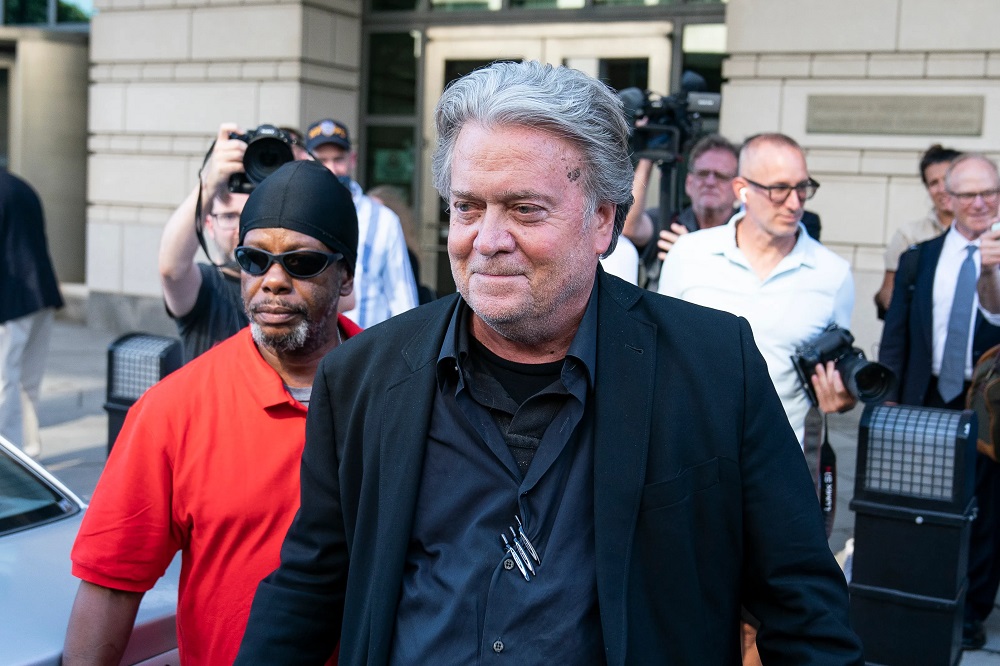
OPINION: This article contains commentary which may reflect the author’s opinion
Steve Bannon, the host of the War Room program, had his lawyers file a motion for a new trial after a very odd July trial where the jury found Bannon guilty and set him up for real jail time over an excessive ‘Contempt of Congress’ charge.
Bannon’s charge was clearly weaponized against him for being a part of the administration of Donald J. Trump. Evidence is unfolding daily that most of Washington DC has some serious credibility problems when dealing with President Donald J. Trump and his associates, like Bannon.
Along with that concern is that Bannon was not allowed to call to court any of the members of Congress who accused him because they were hiding behind the idea that they are allowed to lie while they are in Congress, and the US Constitution protects that right to lie.
Bannon, who was charged for failing to comply with a subpoena from the corrupt House January 6 committee, cites improper action by the FBI in the filing. There has been no comment by the DOJ about Bannon’s claims.
“Lawyers for Stephen K. Bannon, who was convicted of two counts of contempt of Congress late last month, filed a motion for a new trial on Friday, arguing that the judge misinterpreted the law and wrongly prevented Bannon from calling members of Congress as witnesses,” Joel Pollak reported for Breitbart news.
As defense attorney David Schoen explained to Breitbart News earlier in July, the court adopted a narrow view of the standard of “willfulness,” holding that Bannon could be convicted even if he followed the advice of his lawyers” Pollak wrote.
The motion for a new trial raises the issue of “willfullness” again and states:
“Mr. Bannon was barred from putting on any evidence or argument that he never believed he was doing anything unlawful; and indeed, understood and believed that he responded to the subpoena in the only way the law permitted, once executive privilege was invoked. How to respond to a congressional subpoena, let alone when executive privilege is invoked, certainly is not an intuitive process; but Mr. Bannon was prohibited from putting on evidence or argument that he relied on his experienced lawyer’s direction that the law prohibited him from complying with the subpoena.”
In a supplemental brief, Bannon’s counsel argues that the court improperly refused to allow Bannon to call witnesses in his own defense, including the members of Congress who claimed the authority to issue the subpoena. Instead, the January 6 Committee sent staff members who were allowed to decide what evidence they would provide or withhold under the protection of the Speech and Debate Clause.
“They shall in all Cases, except Treason, Felony and Breach of the Peace, be privileged from Arrest during their Attendance at the Session of their respective Houses, and in going to and returning from the same; and for any Speech or Debate in either House, they shall not be questioned in any other Place,” reads the US Constitution about the Speech and Debate Clause, which the opponents of Trump have exploited to mean- they can lie.
According to MTSU:
The speech and debate clause, which appears in Article 1, section 6 of the US Constitution, was written before the First Amendment and had a more limited scope.
The clause, whose inclusion reflected the development of an independent Parliament in England, states that “for any Speech or Debate in either House, they [members] shall not be questioned in any other Place.” It follows a provision, now largely moot, that prevents the arrest, for civil cases, of members traveling to or from sessions of Congress.
The speech and debate clause protects Congress members from lawsuits over legislative speech
The general purpose of the speech and debate clause is to protect members of Congress from having to worry that anything they say in the course of legislative activities will implicate them in a lawsuit.
The judge in Bannon’s trial was Trump appointee Carl Nichols. He could decide to order a new trial — or to overturn the jury’s verdict unilaterally, the subject of a separate motion. Bannon is due to be sentenced in October; he could face up to a year in prison for each count.
The Washington Times reported the Defense team said Bannon was barred ‘from conveying key details to the jury.’
“The former Trump adviser’s legal team says the court violated their client’s constitutional rights by granting a motion by the prosecution that precluded Mr. Bannon from defending himself.
Mr. Bannon had hoped to convey to the jury that his hands were tied by former President Donald Trump’s claims of executive privilege and that he was following the advice of his counsel by not handing over documents and appearing for a deposition before the committee” The Washington Times reported.
“The effect of the Court’s Order was to bar Mr. Bannon from putting on any evidence or argument whatsoever as to the true reasons he responded to the subpoena as he did,” lawyers Evan Corcoran and David Schoen wrote in the motion filed Friday.
“Mr. Bannon was barred from putting on any evidence or argument that he never believed he was doing anything unlawful; and indeed, understood and believed that he responded to the subpoena in the only way the law permitted, once executive privilege was invoked,” Bannon’s attorney said.
Source: The Republic Brief